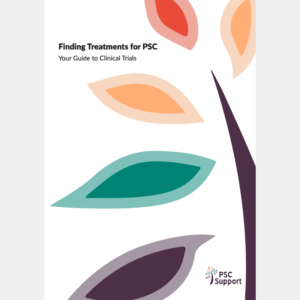The Asp-PSC Study
Evaluating Aspirin in PSC
Recruiting soon

Thinking of taking part?
- Check how suitable you are by looking at the information below.
- Check our map to see if you can get to a study site.
- Contact the research team for more details if you think you are suitable. Check back regularly as we are adding more contact info every day.
- Got a question? Our Clinical Trials Pack has lots of information about how to join clinical trials, switching hospitals for trials and what's involved.
- Contact us if you need any help.
Quick Links
About Asp-PSC
PSC is an autoimmune disease affecting the bile ducts and liver. Most people with PSC also have (IBD). We know that some people with PSC go on to develop liver failure and so need a transplant, and some people with both PSC and IBD have an increased risk of cancer of either the liver, bile ducts, gallbladder or bowel. Although they have a yearly colonoscopy (to look for signs of bowel cancer) detecting other cancers is currently more challenging.
Recent studies have suggested that taking aspirin may reduce the risk of developing these cancers in patients without PSC. This study will look at whether people with both PSC and IBD who take aspirin have a lower risk of developing a PSC-related cancer and a lower risk of needing a liver transplant.
FAQs
| Trial Name | The Asp-PSC Study
Effect of Aspirin on Reducing Cancer & Improving Outcomes in Primary Sclerosing Cholangitis |
| ClinicalTrials.gov Identifier | ISRCTN12358813 |
| Phase | 3 |
| Intervention | Aspirin or placebo (dummy drug) once daily for 5 years |
| Recruiting now? | Recruiting soon at hospitals across the UK (February 2024) |
| Participating Centres | See PSC Support map, the current sites list on Clinicaltrials.gov and UK-PSC for up-to-date status for each centre. |
| Liver disease diagnosis | Primary sclerosing cholangitis |
| Age | 18 and over |
| Females: can I be pregnant? | Yes |
| Is IBD (inflammatory bowel disease) allowed? | Yes |
| Is there an ALP (alkaline phosphatase) requirement? | No |
| Can I take UDCA (Urso),mesalazine, azathioprine or mercaptopurine, or a biologic therapy? | If you are already on ursodeoxycholic acid (also known as UDCA or urso), mesalazine, azathioprine or mercaptopurine, or a biologic therapy for your IBD, the dose must have remained the same for 12 weeks before you start the study. |
| Can I take part if I have a stent? | Yes |
| Are recent acute cholangitis (ie bacterial cholangitis) attacks allowed? | Yes |
| Can I take part if I have had a liver transplant? | Unfortunately, you cannot take part if you have had liver transplant. |
| Is cirrhosis allowed? | Yes |
| Previous studies and information | Review of aspirin in cancer: Shen X, Shen X. A potential role for aspirin in the prevention and treatment of cholangiocarcinoma. International Journal of Cancer. 2021 Mar 15;148(6):1323-30. https://doi.org/10.1002/ijc.33323 |
| Are travel expenses covered? | Yes |
| Procedures and tests include: |
|
| How many study visits will there be? How long will each study visit be? | There are 12 visits to the hospital in total. |
| Duration of study (treatment duration/follow-up) | The treatment duration will be for 5 years in total with a maximum period of follow-up for 5 years. You will not be expected to attend any trial visits in the follow-up period as data will be collected from your health records. |
| Basic design of study | A multicentre, double-blind, randomised placebo-controlled trial. |
| How is the study drug thought to work? | Research suggests that aspirin might reduce cancer risk by acting on various molecular pathways that promote cancer. |
| More detailed information about the trial | Patient information Sheet |
| Link to sponsor | https://www.imperial.ac.uk/department-surgery-cancer/research/cancer/research-areas/clinical-trials/ |

